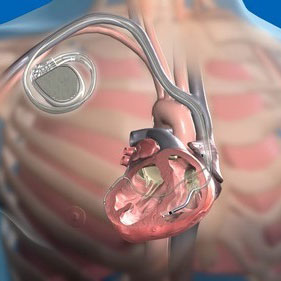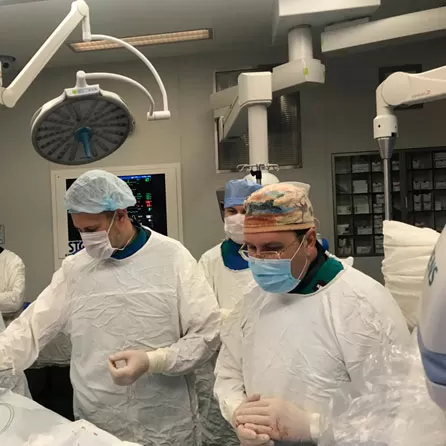
Implantation of an electric cardiac pacemaker
A Cardiac pacemaker is the device which generates electric pulses that regulate the cardiac rhythm.
INDICATIONS TO IMPLANTATION OF AN ELECTRIC CARDIAC PACEMAKER
- sinoatrial node dysfunction;
- atrioventricular block;
- bradycardic auricular fibrillation.
IMPLANTATION OF AN ELECTRIC CARDIAC PACEMAKER AT THE RCMC
The operation of cardiac pacemaker implantation usually involves local anesthesia and X-ray guidance, and is performed at the specialized surgical facility. Through a small incision, the clavicular vein is punctured, and thin electrodes are guided through the vein to the heart muscle. These electrodes are used to conduct electrical pulses from the cardiac pacemaker to the heart. The pacemaker acts as a miniature (weighting merely 30 to 50 g) computer which keeps track of the electrical activity of the heart, and sends electric pulses when it is required.
CONTRAINDICATIONS
There are no absolute contraindications.
PREPARING FOR THE IMPLANTATION OF AN ELECTRIC CARDIAC PACEMAKER
- One to two weeks before the procedure, blood and urine tests, coagulation test, a 12-limb ECG, an X-ray imaging of the thoracic cage and an echocardiography shall be performed. If required, additional testing may be appointed.
- Based on the physicians’ recommendation, the intake of certain drugs may have to be discontinued.
- Refrain from eating for six hours before the examination.
HOW TO PERFORM IMPLANTATION OF AN ELECTRIC CARDIAC PACEMAKER AT THE RCMC
- Call the Contact Center to make an appointment for a consultation.
- Come to the consultation on time.
- On the day of the procedure conclude a contract for the provision of paid services at the registry.
- Pay the invoice at the cash desk of the RCMC or via ЕРИП (SSIS: Single Settlement and Information Space)
Branch services
The information presented in this Price List is for guidance only. Some services are provided only in conjunction with other services. Therefore, the final price may differ from those presented on this site when contacting a medical center to conclude a contract for the provision of medical services.
Имплантация электрокардиостимулятора
Вверх
Услуга
цена для граждан:
беларуси
снг
остальных стран
Имплантация электрокардиостимулятора (ЭКС) однокамерного (без учета стоимости изделий медназначения)
1461 р. 54 к.
2697 р. 49 к.
2697 р. 49 к.
Имплантация электрокардиостимулятора (ЭКС) двухкамерного (без учета стоимости изделий медназначения)
1889 р. 82 к.
3446 р. 24 к.
3446 р. 24 к.




